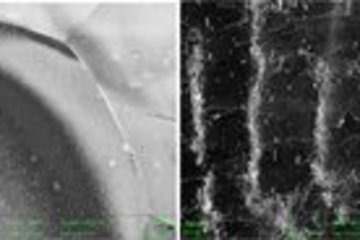All genres
1.
Journal Article
Improved thermal stability of NbCoSn half-Heusler compounds via Sb doping-induced complementary point defect evolution. Chemical Engineering Journal 518, 164845 (2025)
2.
Journal Article
Unveiling nonmonotonic chemical trends in the solubility of H in complex Fe–Cr–Mn carbides by means of ab initio based approaches. Physical Review Materials 6 (1), 014403 (2022)
3.
Journal Article
Tetragonal fcc-Fe induced by κ-carbide precipitates: Atomic scale insights from correlative electron microscopy, atom probe tomography, and density functional theory. Physical Review Materials 2, 023804, pp. 1 - 6 (2018)
4.
Journal Article
The role of kappa carbides as hydrogen traps in high-Mn steels. Metals 7 (7), 264 (2017)
5.
Journal Article
Ab initio explanation of disorder and off-stoichiometry in Fe–Mn–Al–C κ carbides. Physical Review B 95, 104108 (2017)
6.
Journal Article
Combined atom probe tomography and density functional theory investigation of the Al off-stoichiometry of κ-carbides in an austenitic Fe–Mn–Al–C low density steel. Acta Materialia 106, pp. 229 - 238 (2016)
7.
Talk
Ab initio basierte Simulation zur Wasserstoffversprödung in hoch-Mn Stählen. Seminar der Staatlichen Materialprüfungsanstalt Darmstadt, Institut für Werkstoffkunde, Darmstadt, Germany (2020)
8.
Talk
κ carbide microstructures and the role of interfaces in high-Mn lightweight steels. High-Mn Steel 2019, Aachen, Germany (2019)
9.
Talk
Materials design based on ab initio methods: Coherent microstructure & its impact on real application. Seminar at TU Delft, Delft, The Netherlands (2018)
10.
Talk
Understanding Hydrogen Embrittlement based on ab initio methods. Seminar at Linköping University, Linköping, Sweden (2018)
11.
Talk
Ab-initio investigation of the role of kappa carbide in upgrading Fe–Mn–Al–C alloy to the class of advanced high-strength steels. ArcelorMittal Global R&D Gent, Thessaloniki, Greece (2017)
12.
Talk
Ab initio investigation of the interaction of hydrogen with carbides in advanced high-strength steels. Seminar at Southern University of Science and Technology, Shenzhen, China (2017)
13.
Talk
Ab-initio study of the interplay of hydrogen and microstructure in Ni-based superalloys. DPG 2017, Dresden, Germany (2017)
14.
Talk
Ab-initio investigation of the interaction of hydrogen with carbides in advanced high-strength steels. TMS 2017, San Diego, CA, USA (2017)
15.
Talk
Ab-Initio Guided Design of Twinning Induced Plasticity and Weight Reduced Austenitic Steels. MRS Fall Meeting, Boston, MA, USA (2016)
16.
Talk
An ab-initio prediction of the off-stoichiometry of Fe–Mn–Al–C κ carbides. CALPHAD XLV, Awaji Island, Hyogo, Japan (2016)
17.
Talk
Origin of the off-stoichiometry of Fe–Mn–Al–C κ carbides: An ab-initio explanation of atom probe tomography data. DPG 2016, Regensburg, Germany (2016)
18.
Talk
Atomistic understanding of structure and deformation of nano-sized kappa-carbide precipitates in light-weight steels. APT&M 2016, The 55th International Conference on Atom Probe Tomography & Microscopy, Gyeongju, South Korea (2016)
19.
Talk
Ab initio explanation of off-stoichiometry in Fe–Mn–Al–C κ carbides. Intermetallics 2015, Bad Staffelstein, Germany (2015)
20.
Talk
Ab initio understanding of interaction of kappa carbide with hydrogen in steels. Oak Ridge National Laboratory, Oak Ridge, TN, USA (2015)











